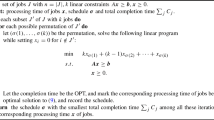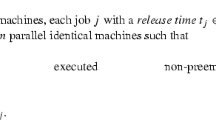Abstract
We consider scheduling problems in which a job consists of components of different types to be processed on m machines. Each machine is capable of processing components of a single type. Different components of a job are independent and can be processed in parallel on different machines. A job is considered as completed only when all its components have been completed. We study both completion time and flowtime aspects of such problems. We show both lowerbounds and upperbounds for the completion time problem. We first show that even the unweighted completion time with single release date is MAX-SNP hard. We give an approximation algorithm based on linear programming which has an approximation ratio of 3 for weighted completion time with multiple release dates. We give online algorithms for the weighted completion time which are constant factor competitive. For the flowtime, we give only lowerbounds in both the offline and online settings. We show that it is NP-hard to approximate flowtime within Ω(logm) in the offline setting. We show that no online algorithm for the flowtime can have a competitive ratio better than 
Preview
Unable to display preview. Download preview PDF.
Similar content being viewed by others
References
Abramson, D., Sosic, R., Giddy, J., Hall, B.: Nimrod: A tool for performing parameterised simulations using distributed applications. In: Proceedings of the 4th IEEE Symposium on High Performance Distributed Computing, IEEE Computer Society Press, Los Alamitos (1995)
Afrati, F., Bampis, E., Chekuri, C., Karger, D., Kenyon, C., Khanna, S., Milis, I., Queyranne, M., Skutella, M., Stein, C., Sviridenko, M.: Approximation schemes for minimizing average weighted completion time with release dates. In: FOCS, pp. 32–44 (1999)
Awerbuch, B., Azar, Y., Leonardi, S., Regev, O.: Minimizing the flow time without migration. In: ACM Symposium on Theory of Computing (STOC), pp. 198–205 (1999)
Brixius, N., Linderoth, J., Goux, J.: Solving large quadratic assignment problems on computational grid. Mathematical Programming, Series B 91, 563–588 (2002)
Chakrabarti, S., Phillips, C., Schulz, A., Shmoys, D., Stein, C., Wein, J.: Improved scheduling algorithms for minsum criteria. In: Proc. of the 23rd Int. Colloquium on Automata, Languages and Programming, pp. 646–657 (1996)
Chen, Z., Hall, N.: Supply chain scheduling: Assembly systems. Technical report, The Ohio State University (2000)
Gandhi, R., Halldorsson, M., Kortsarz, G., Shachnai, H.: Improved results for data migration and open shop scheduling. In: Proc. of the 31st Int. Colloquium on Automata, Languages, and Programming, pp. 658–669 (2004)
Goux, J., Kulkarni, S., Linderoth, J., Yoder, M.: Master-worker: An enabling framework for applications on the computational grids. In: Proceedings of the 9th IEEE Symposium on High Performance Distributed Computing, pp. 43–50 (2000)
Hall, L., Schulz, A., Shmoys, D., Wein, J.: Scheduling to minimize average completion time: offline and online algorithms. Mathematics of Operations Research 22, 513–549 (1997)
Hoogeveen, H., Schuurman, P., Woeginger, G.: Non-approximability results for scheduling problems with minsum criteria. In: Bixby, R.E., Boyd, E.A., Ríos-Mercado, R.Z. (eds.) Integer Programming and Combinatorial Optimization. LNCS, vol. 1412, pp. 353–362. Springer, Heidelberg (1998)
Leung, J., Li, H., Pindeo, M.: Multidisciplinery scheduling: Theory and Applications. chapter Order Scheduling Models: an overview, 37–56 (2005)
Linderoth, J., Wright, S.: Decomposition algorithms for stochastic programming on a computational grid. Computational Optimization and Applications 24, 207–250 (2003)
Papadimitriou, C., Yannakakis, M.: Optimization, approximation, and complexity classes. Journal of Computer and System Sciences 43, 425–440 (1991)
Queyranne, M.: Structure of a simple scheduling polyhedron. Mathematical Programming 58, 263–285 (1993)
Queyranne, M., Svirdenko, M.: New and improved algorithms for minsum shop scheduling. In: Symposium on Discrete Algorithms, pp. 871–878 (2000)
Raz, R., Safra, S.: A sub-constant error-probability low-degree test, and a sub-constant error-probability PCP characterization of NP. In: ACM Symposium on Theory of Computing (STOC), pp. 475–484 (1997)
Roemer, T.: A note on the complexity of the concurrent open shop problem. Journal of scheduling 9, 389–396 (2006)
Schulz, A.: Scheduling to minimize total weighted completion time: Performance guarantees of lp-based heuristics and lower bounds. In: Cunningham, W.H., Queyranne, M., McCormick, S.T. (eds.) Integer Programming and Combinatorial Optimization. LNCS, vol. 1084, pp. 301–315. Springer, Heidelberg (1996)
Wagneur, E., Sriskandarajah, C.: Open shops with jobs overlap. European Journal of Operations Research 71, 366–378 (1993)
Wang, G., Cheng, T.: Customer order scheduling to minimize total weighted completion time. Omega 35, 623–626 (2007)
Author information
Authors and Affiliations
Editor information
Rights and permissions
Copyright information
© 2007 Springer-Verlag Berlin Heidelberg
About this paper
Cite this paper
Garg, N., Kumar, A., Pandit, V. (2007). Order Scheduling Models: Hardness and Algorithms. In: Arvind, V., Prasad, S. (eds) FSTTCS 2007: Foundations of Software Technology and Theoretical Computer Science. FSTTCS 2007. Lecture Notes in Computer Science, vol 4855. Springer, Berlin, Heidelberg. https://doi.org/10.1007/978-3-540-77050-3_8
Download citation
DOI: https://doi.org/10.1007/978-3-540-77050-3_8
Publisher Name: Springer, Berlin, Heidelberg
Print ISBN: 978-3-540-77049-7
Online ISBN: 978-3-540-77050-3
eBook Packages: Computer ScienceComputer Science (R0)




